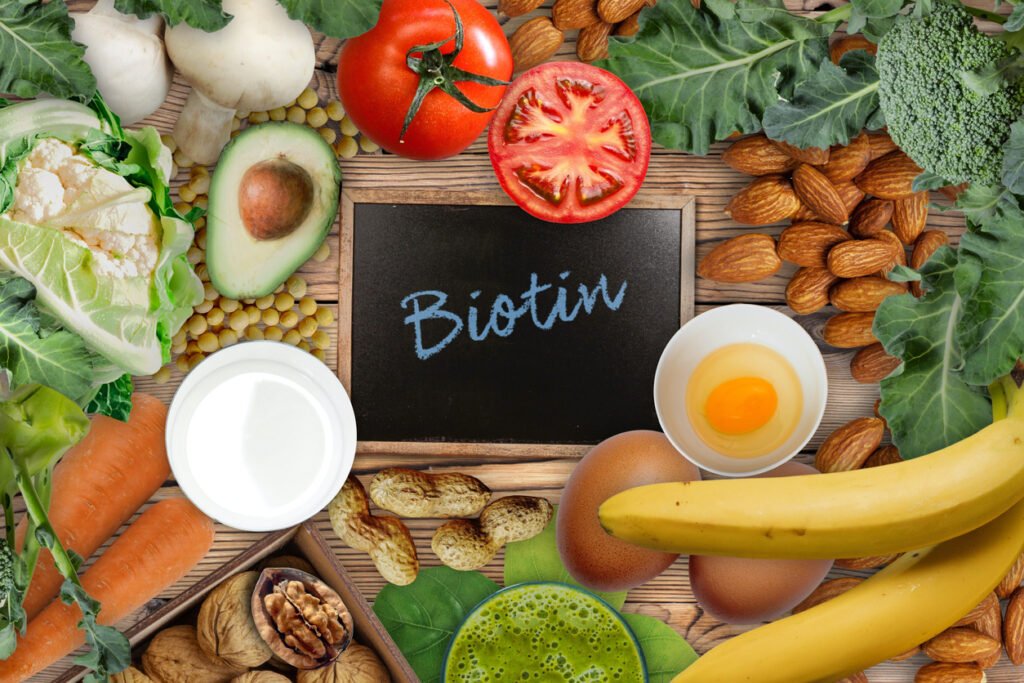Discover what this essential B vitamin can do for your body and whether you need more in your diet.
Biotin supplements are often touted for their ability to enhance the shine of your hair, strengthen your nails, and give your skin a radiant glow—all while providing essential nutrients to your body. But do they actually work? And what exactly is it?
What Is Biotin
The Role in Energy Metabolism
It is also known as vitamin B7, is part of the B vitamin family and plays a vital role in energy metabolism by converting carbohydrates, fats, and proteins into energy your body needs to function optimally.
Why It Is Essential
Since it is an essential nutrient, your body cannot produce it on its own. You must obtain it through your diet or supplements to maintain optimal levels. Most adults require about 30 micrograms per day.
Read More: Is American Food Really Unhealthy?
Signs of Biotin Deficiency
Although rare, a deficiency can lead to noticeable symptoms such as thinning hair, skin rashes, brittle nails, fatigue, and depression.
The Role in Skin, Hair, and Nail Health
Sarah Schlichter, M.P.H., RDN, highlights biotin’s benefits for maintaining healthy skin, nails, and hair. A lack of it can contribute to hair loss and skin issues, making it a key nutrient for overall appearance.
Does More Mean Better Hair?
While biotin is essential for hair health, taking excessive supplements doesn’t guarantee stronger, thicker, or shinier hair. The National Institutes of Health states there’s minimal evidence supporting the claim that biotin supplements significantly enhance hair or skin health.
5 Health Benefits of Biotin
May Strengthen Nails
Taking high doses might assist individuals with thin nails in growing thicker, stronger, and less brittle nails. However, the research on this topic is limited, according to the NIH, indicating that further studies are necessary.
Biotin May Promote Healthy Metabolism
It plays a crucial role in metabolic processes, particularly in converting food into energy. “As one of the B vitamins, it aids in transforming macronutrients (carbohydrates, proteins, and fats) into energy, which is then distributed throughout the cells for optimal functioning,” explains Schlichter.
May Help Regulate Blood Sugar
A meta-analysis found that this supplementation could lower fasting blood glucose levels in individuals with type 2 diabetes, although its effects on insulin remain uncertain, according to Schlichter. While further research is necessary, these results underscore its potential advantages in managing blood sugar levels.
May Support Brain Health
The brain requires a significant amount of glucose daily. However, insufficient biotin for effective glucose metabolism may negatively impact brain health. Fortunately, studies indicate that adequate intake may help protect against depression, stress, and anxiety by supporting overall nervous system function.
May Improve Heart Health
Maintaining adequate its levels can contribute to heart health. “Research indicates a connection between biotin supplementation and lower total cholesterol and triglyceride levels,” states Schlichter.
Food Sources of Biotin
Some of the best dietary sources of it include:
Beef Liver: A Powerhouse
Beef liver is an excellent source of biotin, providing 103% of the Daily Value (DV) in a 3-ounce serving, with 31 micrograms. If you’re looking for ways to incorporate it into your meals, try recipes like Grilled Liver Kebabs.
Eggs: Biotin-Rich and Versatile
Eggs, particularly the yolk, are a fantastic source of it. A medium egg contains 10 micrograms, covering 33% of your daily requirement. For a quick and healthy option, try 3-Ingredient Bell Pepper & Cheese Egg Cups.
Salmon: Heart-Healthy and Biotin-Rich
This fatty fish is not only celebrated for its omega-3 fats but also contributes 5 micrograms of it per 3-ounce serving, fulfilling 17% of the DV. Add some variety to your diet with these healthy salmon recipes.
Sunflower Seeds: A Convenient Biotin Boost
Sunflower seeds are a convenient and nutritious snack, offering nearly 3 micrograms of biotin per ¼ cup, meeting 9% of your daily needs. They’re a versatile addition to salads, yogurts, or as a quick on-the-go snack.
Here is the web story of this blog: What ahppens to your body when you cnsume biotin regularly



